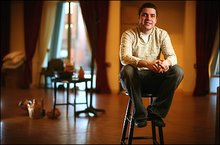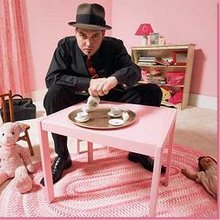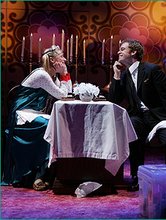(from The Boston Globe)
By Mark Feeney, Globe Staff
March 28, 2007
Noah Haidle grew up assuming he'd be a scientist. So when at 17 he decided he wanted to be a playwright, instead, he used the same method to pursue his goal a scientist would: induction. Yet rather than amassing data by conducting experiments in a laboratory, Haidle amassed data through reading every play he could get his hands on.
"It just became a kind of private obsession," Haidle said last week, sitting outside Wimberly Theatre at the Boston Center for the Arts. The Huntington Theatre will be mounting the world premiere there of Haidle's play "Persephone ." It opens Friday.
"The idea was, if I ingest enough, if I read enough -- because my access to theater was largely through reading -- sooner or later I'll be able to synthesize something of my own. So the bet has kind of paid off."
Paid off handsomely, it would seem. At 28, Haidle (pronounced HIGH-del), is one of the foremost playwrights of his generation. Productions of such darkly comic plays as "Mr. Marmalade ," in which a 4-year-old has an abusive yuppie as an imaginary friend, or "Vigils, " about a woman who keeps the soul of her dead husband in a box, have brought Haidle praise and generated controversy.
Haidle "is the most original young playwright writing today -- and the most daring," Nicholas Martin , who's directing "Persephone," said in a telephone interview.
"You know how a lot of young playwrights have a lot of gratuitous violence or atrocity in their plays, and you think, why? When Noah uses such things, they're not sensationalist. They're a kind of moralistic point of view, though he'd hate me for saying that. He's what I call a foul-mouthed moralist."
"Persephone" has its share of shocking moments, involving acts of violence and sex (the latter both consensual and not). None of those acts directly involves the protagonist, though. Not much can, other than the indignities deposited by the occasional passing pigeon. She's a statue of the Greek goddess Demeter , played by Marilyn Dodds Frank .
Demeter, the Greek goddess of the harvest (whose daughter was Persephone), is the very still point in a sadly turning world. That world reaches from an artist's studio in Florence in 1507, where a sculptor is putting the finishing touches to Demeter, to a New York park 500 years later, where she sits on a begrimed pedestal.
"I don't expect everyone will like 'Persephone,' " Martin said, "but I hope they understand the right things about it. That is, it comes out for humanity -- even though a statue represents humanity in it. I've tried to stage what I call the atrocities with a little bit of poetry, but it's very tricky that line. That's Noah's line, actually, you have to make it ugly because that's the point of the play."
Some of "Persephone" has the jokey-ness of shtick. Other parts are anything but jokey. Haidle says that determinedly uneasy blend is in the nature of how he writes. Laughter and darkness intertwine in his work, eluding any simple designation of comedy and tragedy.
"I've never tried to write a comedy," Haidle declared. "I've never said, let's make this funny -- or no laughs, this is very serious, a tragedy, no laughter. It just happens that way. "
The basic premise -- an immobilized woman directly addressing the audience -- recalls Samuel Beckett's "Happy Days. " Haidle said there was no conscious connection to Beckett, but that he takes any comparisons, however tenuous, as a great compliment.
"The problem with Mr. Beckett is everything he did is so original," Haidle said. "He's my favorite writer of all time -- prose, poetry, plays. I think I've read everything. I'm actually going to Paris after this production just to walk around where he walked, just go see his apartment and stuff. I'm absolutely obsessed with him."
Beckett heads an eclectic list of favorites. Haidle also cited Chekhov , Tennessee Williams , Thornton Wilder , among others. It was Wilder who wrote the first play Haidle saw, "Our Town."
"Clear as day," Haidle replied when asked how well he remembers the experience. "Still, when I imagine a theater, I imagine the space in Grand Rapids, Mich., where I first saw that."
Haidle remembers the space fondly but not the town. Grand Rapids, he said, "is a furniture town, very Christian, very Republican. Gerald Ford is buried there. It was snowy and cold."
One of the reasons Haidle went to Princeton, where he studied as an undergraduate, was to get away from Michigan. "I was in one of those fancy eating clubs," he recalled. "In 'This Side of Paradise, ' F. Scott Fitzgerald described the one I was in as 'breathlessly aristocratic.' I didn't know what I was doing there."
After Princeton, Haidle studied with Christopher Durang at Juilliard and now lives in New York. He's started work on a novel and has written several screenplays, but the theater remains his passion.
Haidle's had plays produced at some of America's most prestigious theater companies: New York's Roundabout did "Mr. Marmalade " in 2005. "Vigils " debuted at Chicago's Goodman Theatre last year. He's also had plays produced at California's South Coast Repertory and the Long Wharf Theatre, in New Haven. In July, Company One will put on "Mr. Marmalade" at the BCA.
"The greatest gift anyone can give you is their time," Haidle said. "In the theater, unlike a novel or a poem, you have people's time, their undivided attention. They can't put [a play] down on the night stand. They have to be there, they have to be present. I don't think there's anything more immediate than that."
Regardless of what Haidle's working on, there's one constant in his writing: a manual typewriter. "It started out kind of like wearing a bow tie, kind of an affectation," Haidle said. "Then it took hold and I think I'm on my third one. I've broken two. Now it's an Olivetti , from the '60s, that's aquamarine or turquoise."
Typing, he said, "makes writing something that's physically difficult. After writing, my fingers are sore. Also, I love the look of the page, the feel of the page, the typewritten page. It feels like I've accomplished something. 'Oh, I've done that today,' instead of being stored in some computer."
Subscribe to:
Post Comments (Atom)







No comments:
Post a Comment